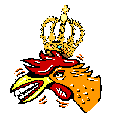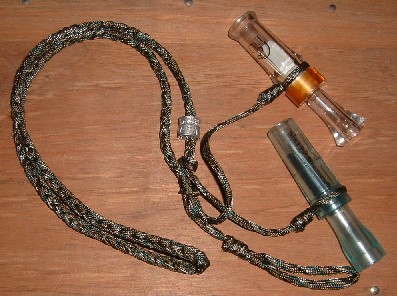
.gif)
[Home] [What's New] [About the K&R] [Links] [Site Map]
Hunting Pictures
[Dove]
[Waterfowl]
[Grouse]
[Woodcock]
[Other]
Mallards
[Overview]
[1999-2000]
[2000-2001]
[2001-2002]
[2002-2003]
[2003-2004]
[2004-2005]
[2005-2006]
[2006-2007]
Brothers of a Band
|
On most days my world is confined to a windowless cubicle lit by the cold white glow of fluorescent lamps. On much rarer days, my world is confined only by a horizon bathed in the warm colors of the rising sun. I am duck hunter, and the memories of the latter allow me to endure long days in the former. It is for the longest of these days, when the cube feels the smallest and the lamps the coldest, that I save the memory of one special day afield. The day was a squally Thanksgiving-eve two years ago, and the place a secluded West Virginia mountain wetland. The weather was seasonably temperamental, with moods ranging from bright blue skies revealing a faded crescent moon to intense snow squalls limiting visibility to a few feet. The temperature, tied to the finicky weather, drifted lazily above and below the freezing point as the sun came and went. The ground, giving in to the uncertainty, formed a patchwork of snowy white and dirty brown due to the day-long battle between snow and sun, ice and thaw. With me that day was my friend Eric - my "hunting brother." I say brother for our years of hunting together have banded us as much brothers in common experience as genetics can in common blood. On that late-November day, after setting out a few decoys for an afternoon hunt, we surveyed the scene before us. As usual, just being there had been worth the trip. As snow squalls came and went, and geese honked on the horizon, we passed a duckless afternoon by reminiscing about the journey that had brought us to the edge of this secluded marshland. It was only six years before, clad in plaid shirts and jeans, that we had set out in a wobbly old canoe to try our hand at hunting ducks. With no more experience than what was picked up in hastily read magazines, we boldly banged away at contemptuous ducks with rusty shotguns borrowed from our grandfathers. On that first adventure, our inexperience was matched only by our awe at witnessing an explosion of twenty wood ducks from a narrow cove of flooded timber. While we ended that day with an empty game bag, we succeeded in filling our chests with a determination to make duck hunting a part of our lives. Through five years of success and failure - especially failure, for failure was our greatest teacher - those two hunters with poor gear and poorer shooting skills were transformed into successful waterfowl hunters. Although our journey had already filled countless reels of film with amazing memories, we were just as hungry to make new ones on that November day as we had been on the first. So, late in the afternoon, when a lone duck was eyed on the horizon, the reminiscing stopped and the hunting began. Eric, who had developed into an excellent caller, immediately began to talk to the distant bird. With an inflection here and a change in pitch there, he reached out and began, as if with a long invisible string, to slowly pull the duck in closer and closer until I saw the sun bounce off an emerald green head. The mallard, however, was not ready to commit, and settled into a high, wary circle. After several long minutes of following the cautious bird through a gap in my gnarly button-bush blind, I noticed a new snow squall building in the northwest. From the aggressive renewal of his calling, I knew Eric had seen it too; if a duck was to be taken out of the swamp that day, it would have to be this lonely mallard. Our decoy spread once again came alive with faux voice; a quick grunt, a quicker one yet, silence, a little feed chatter, another grunt, a plea. The green-head responded on the next couple of passes, each time lining up into the wind and cupping his wings only to back off and resume circling. The squall continued to race toward the wetland. A glance toward the nearby hills revealed only an approaching grey wall. "Come on, come on," I muttered to myself as I tried to will the bird down on yet another pass. Now over ten minutes since spotting the mallard, the wind increased and the setting sun disappeared for good behind the oncoming snow. With a final burst of emotion, but without a hint of desperation, a last call exploded from the swamp. This time, the wings remained cupped. Eric had brought him in, now it was my turn. I had now been motionless, save a thumping heart, for many minutes. My muscles had stiffened in the cold, and I worried if they would respond to my commands. Tension too had wormed its way into my limbs, as Eric's expert calling and the race against the snow had increased the pressure to finish the job. It was now when the summer clay-shooting and fall dove-hunting paid the richest dividends. As the duck passed in front of me, instinct took over, and my cold muscles responded. Swinging with the bird from left to right, I threw my trusty Mossberg in front of a streaking green head and pulled the trigger. As the first flakes fell, the wings folded, and a mallard went down. I have a
mixture of feelings when I bring a bird down; satisfaction on a
successful hunt and respect for the game are two. Deeper than
these sensations, however, lies an ineffable feeling of connection
with a primitive part of myself. A rediscovery of an interaction
with the natural world that is lost behind the blinding glare of
fluorescent lamps. I never felt it more than when that lone
mallard hit the water behind those dancing snowflakes. There was
to be one more reward, however. Pulling the mallard out of the icy
water, I noticed a little hardware. We had our first band.
|
[Back to 2002-2003 Mallard Hunting]
[Home] [What's New] [About the K&R] [Links] [Site Map]
King and Rooster © 2004 All Rights Reserved
